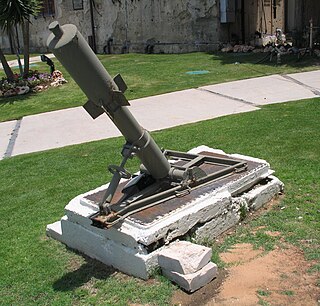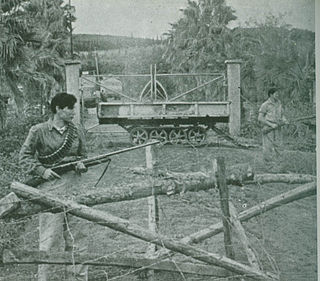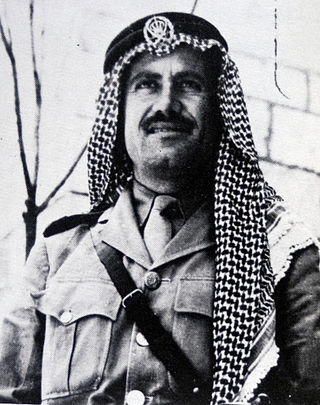
Zionist political violence refers to acts of violence or terrorism committed by Zionists in support of establishing and maintaining a Jewish state in Palestine. These actions have been carried out by individuals, paramilitary groups, and the Israeli government, from the early 20th century to the present day, as part of the ongoing Israeli-Palestinian conflict.
Killings and massacres during the 1948 Palestine war resulted in the deaths of many civilians and unarmed soldiers.

Operation Nachshon was a military operation of the Haganah during the 1947–1948 civil war in Mandatory Palestine and part of Plan Dalet. Its objective was to open the Tel Aviv – Jerusalem road blockaded by Palestinian Arabs, and furnish arms and supplies to the besieged Jewish community of Jerusalem. The operation was also known as "The operation to take control of the Jerusalem road," following which participating units later broke off to form the Harel Brigade. Following attempts to take control of the road to Jerusalem were unsuccessful and led to the construction of a makeshift bypass—Burma Road.

On May 13, 1948, a day before the state of Israel was proclaimed, the Haganah launched Operation Shfifon with the aim of capturing the British outposts in the Old City of Jerusalem and preventing the Arab forces from taking control of them first. Such an eventuality had long been anticipated, and plans prepared called Operation Shfifon and quickly followed by Operation Kilshon.

Plan Dalet was a Zionist military plan executed during the 1948 Palestine war for the conquest of territory in Mandatory Palestine in preparation for the establishment of a Jewish state. The plan was the blueprint for Israel's military operations starting in March 1948 until the end of the war in early 1949, and so played a central role in the 1948 Palestinian expulsion and flight known as the Nakba.

The Kfar Etzion massacre refers to a massacre of Jews that took place after a two-day battle in which Jewish Kibbutz residents and Haganah militia defended Kfar Etzion from a combined force of the Arab Legion and local Arab men on May 13, 1948, the day before the Israeli Declaration of Independence. Of the 127 Haganah fighters and Jewish kibbutzniks who died during the defence of the settlement, Martin Gilbert states that fifteen were killed on surrendering.

A series of attacks were perpetrated or ordered by Palestinian Arabs, some of them acting as suicide bombers, on Jewish targets in Jerusalem's Ben Yehuda Street from February 1948 onwards. Ben Yehuda Street was a major thoroughfare.
John Lawrence Collins Jr. was an American writer.

Dominique Lapierre was a French author.
O Jerusalem! is a 1972 book by Dominique Lapierre and Larry Collins about the creation of the state of Israel.

O Jerusalem is a 2006 drama film directed by Elie Chouraqui. It is based on the historical documentary novel of the same name, written by Dominique Lapierre and Larry Collins.

The Davidka was a homemade Israeli mortar used in Safed and Jerusalem during 1947–1949 Palestine war. Its bombs were reported to be extremely loud, but very inaccurate and otherwise of little value beyond terrifying opponents; they proved particularly useful in scaring away both Arab soldiers and civilians. It is nominally classified as a 3-inch (76.2 mm) mortar, although the bomb was considerably larger.

The 1947–1948 civil war in Mandatory Palestine was the first phase of the 1947–1949 Palestine war. It broke out after the General Assembly of the United Nations adopted a resolution on 29 November 1947 recommending the adoption of the Partition Plan for Palestine.

An attack was carried out by the Jewish paramilitary group Haganah on the Christian-owned Semiramis Hotel in the Katamon neighborhood of Jerusalem during the 1947–1948 Civil War in Mandatory Palestine.

The Battles of Latrun were a series of military engagements between the Israel Defense Forces and the Jordanian Arab Legion on the outskirts of Latrun between 25 May and 18 July 1948, during the 1948 Arab–Israeli War. Latrun takes its name from the monastery close to the junction of two major highways: Jerusalem to Jaffa/Tel Aviv and Gaza to Ramallah. During the British Mandate it became a Palestine Police base with a Tegart fort. The United Nations Resolution 181 placed this area within the proposed Arab state. In May 1948, it was under the control of the Arab Legion. It commanded the only road linking the Yishuv-controlled area of Jerusalem to Israel, giving Latrun strategic importance in the battle for Jerusalem.

The Battle of Mishmar HaEmek was a ten-day battle fought from 4 to 15 April 1948 between the Arab Liberation Army commanded by Fawzi al-Qawuqji and the Haganah commanded by Yitzhak Sadeh and Dan Laner. The battle began when al-Qawuqji launched an attack against Mishmar HaEmek with the intent of taking the kibbutz, which was strategically placed beside the main road between Jenin and Haifa. In 1947 it had a population of 550.

Abdullah El Tell served in the Transjordanian Arab Legion during the 1948 war in Palestine rising from the rank of company commander to become Military Governor of the Old City of Jerusalem. He was later accused of being involved in the assassination of King Abdullah I−which he denied−and spent many years in Egypt before returning to Jordan in 1967.
Lilly Rivlin is an American- Israeli journalist, writer, and filmmaker in the genre of documentary/ political films on women's issues.

Events in the year 1948 in the British Mandate of Palestine.

Operation Yevusi, also known as the Second Battle of Nebi Samwil, was a Palmach military operation carried out during the 1948 Arab–Israeli War to assert Jewish control over Jerusalem. The operation, commanded by Yitzhak Sadeh, lasted two weeks, from 22 April 1948 to 3 May 1948. Not all objectives were achieved before the British enforced a ceasefire.
















